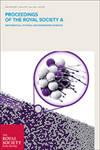Stability of longitudinal sediment waves formed by turbidity currents: linear and weakly nonlinear perspectives
IF 2.9
3区 综合性期刊
Q1 MULTIDISCIPLINARY SCIENCES
Proceedings of the Royal Society A: Mathematical, Physical and Engineering Sciences
Pub Date : 2023-09-01
DOI:10.1098/rspa.2023.0367
引用次数: 1
Abstract
We perform the linear and weakly nonlinear stability analyses of longitudinal sediment waves triggered by the interaction of turbidity currents with an erodible bed. The mathematical framework is based on the two-dimensional flow equations, advection–diffusion equation for sediment concentration and Exner equation for bed evolution. Using the standard linearization, the linear analysis offers the resonant wavenumber that maximizes the growth rate of sediment waves. We study the influence of the key parameters, such as the gravitational parameter, longitudinal bed slope, Rouse number, shear Reynolds number, relative roughness number and erosion coefficient, on the growth rate, resonant wavenumber and phase velocity. The results reveal that the longitudinal sediment waves migrate both upstream and downstream. By plotting the gravitational parameter against the dimensionless wavenumber, we obtain a stability diagram that accurately captures the experimental data plots within the unstable zone. Additionally, we explore the perturbation fields of velocity components, pressure and sediment concentration. Employing the centre manifold projection, the weakly nonlinear analysis provides the equilibrium amplitude of sediment waves and its sensitivity to the key parameters. The predicted wavelength and amplitude of sediment waves are comparable with field observations in the Atlantic Ocean, the Sea of Japan and the Pacific Ocean.浊流形成的纵向沉积波的稳定性:线性和弱非线性视角
我们对由浊流与可蚀床相互作用引发的纵向泥沙波进行了线性和弱非线性稳定性分析。数学框架基于二维流动方程、泥沙浓度的平流-扩散方程和河床演变的Exner方程。使用标准线性化,线性分析提供了最大化泥沙波增长率的共振波数。研究了重力参数、河床纵坡、劳斯数、剪切雷诺数、相对粗糙度数和侵蚀系数等关键参数对生长速率、共振波数和相速度的影响。结果表明,纵向泥沙波浪向上游和下游均有迁移。通过绘制引力参数与无量纲波数的关系图,我们获得了一个稳定图,该图准确地捕捉了不稳定区内的实验数据图。此外,我们还探讨了速度分量、压力和含沙量的扰动场。利用中心流形投影,弱非线性分析提供了泥沙波的平衡振幅及其对关键参数的敏感性。预测的沉积波的波长和振幅与大西洋、日本海和太平洋的实地观测结果相当。
本文章由计算机程序翻译,如有差异,请以英文原文为准。
求助全文
约1分钟内获得全文
求助全文
来源期刊
CiteScore
6.40
自引率
5.70%
发文量
227
审稿时长
3.0 months
期刊介绍:
Proceedings A has an illustrious history of publishing pioneering and influential research articles across the entire range of the physical and mathematical sciences. These have included Maxwell"s electromagnetic theory, the Braggs" first account of X-ray crystallography, Dirac"s relativistic theory of the electron, and Watson and Crick"s detailed description of the structure of DNA.

 求助内容:
求助内容: 应助结果提醒方式:
应助结果提醒方式:


